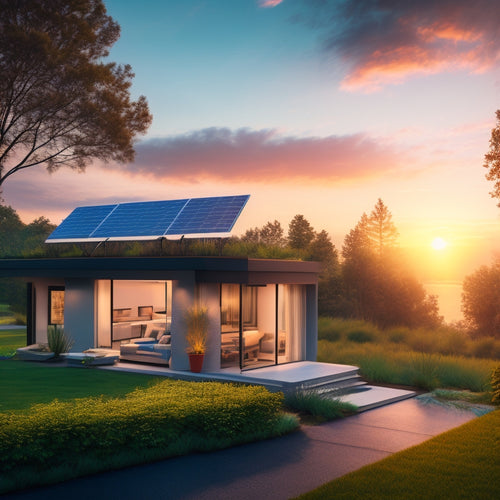
Considerations for Outdoor Solar Panel Installation
Share
When you're considering outdoor solar panel installation, think about key factors such as roof type, panel angle, and long-term savings. Choosing the right roof guarantees maximum efficiency, while proper tilt and orientation enhance sunlight capture year-round. You'll also benefit from significant reductions in electricity bills and carbon footprints, contributing to a cleaner environment. Plus, solar panels require minimal maintenance, making them an easy choice for energy independence. By evaluating these considerations carefully, you'll make a strategic decision that echoes long into the future. There's plenty more to investigate on maximizing the advantages of your solar investment.
At a Glance
- Assess roof type compatibility, as asphalt, metal, and tile roofs have different installation requirements and efficiencies.
- Ensure proper angle and orientation for solar panels to maximize sunlight capture throughout the year.
- Choose disturbed land for installations to minimize environmental impact and preserve sensitive habitats.
- Explore government incentives and rebates to reduce upfront installation costs and enhance long-term savings.
- Plan for minimal maintenance, as solar panels require little upkeep and can self-clean with rainwater.
Long-Term Energy Savings
Installing outdoor solar panels can greatly reduce your electricity bills over time, leading to considerable long-term savings.
With solar panel efficiency improving due to advancements in technology, homeowners can capture more energy from the sun than ever before, which means increased energy independence.
Additionally, you can take advantage of various government incentives that make this investment even more attractive.
Reduced Electricity Bills
While many homeowners initially hesitate to invest in solar panels due to upfront costs, the long-term savings on electricity bills can make this decision financially savvy.
Once you complete the installation process, you'll start reaping the benefits of energy efficiency right away. With solar panels, you're generating your own electricity, which greatly reduces your reliance on the grid and lowers your monthly utility bills.
Over time, these savings can accumulate greatly, often covering the initial investment and more. As electricity prices continue to rise, having your solar system means you won't be as affected by these increases. Instead, you'll enjoy the freedom of predictable energy costs while contributing to a cleaner environment.
Moreover, solar panels can add value to your home, appealing to potential buyers who appreciate sustainable living. The reduced electricity bills can also free up your budget for other pursuits, giving you more financial flexibility.
In essence, investing in solar panels isn't just a decision for today—it's a strategic move for your financial future. By prioritizing energy efficiency through solar energy, you'll ultimately pave the way for long-term savings and greater independence from rising energy costs.
Government Incentives Available
Tax credits, rebates, and other financial incentives from the government can greatly enhance the long-term savings you achieve with solar panel installation.
By taking advantage of federal tax credits, like the Investment Tax Credit (ITC), you can reduce your tax liability considerably—up to 30% of your system's cost. This means more money stays in your pocket, allowing you to invest in other areas of your life or further energy independence.
Additionally, many states offer rebates for solar installations, which can vary widely but often provide considerable upfront savings.
These state rebates can effectively lower your initial investment, making solar power more accessible and appealing.
Environmental Impact Reduction
Installing solar panels greatly reduces your carbon footprint by utilizing renewable energy, which lowers greenhouse gas emissions.
By leveraging solar energy benefits, you not only contribute to a cleaner environment but also support a sustainable future.
By choosing sustainable practices during installation, you can also implement habitat preservation strategies that protect local ecosystems.
This dual benefit not only enhances your environmental responsibility but also contributes to a healthier planet for future generations.
Carbon Footprint Decrease
Many homeowners are increasingly recognizing the vital role outdoor solar panel installations play in reducing their carbon footprint. By utilizing solar energy, you can greatly lower your reliance on fossil fuels, leading to a cleaner environment. This shift not only curtails greenhouse gas emissions but also promotes a sustainable lifestyle that aligns with your desire for freedom from conventional energy sources.
Utilizing sustainable materials in your solar panel systems guarantees that you're making eco-friendly choices right from the start. High-quality panels made from recycled or sustainably sourced components can further minimize environmental impact.
Additionally, employing efficient installation techniques is essential; proper alignment and positioning of your panels can maximize energy capture, leading to greater efficiency and reduced waste.
As you consider solar installation, think beyond the initial investment. The long-term benefits—both financial savings and environmental impact—are considerable.
By integrating solar panels into your home, you're not just making a power choice; you're embracing a lifestyle that prioritizes sustainability. This commitment not only helps reduce your carbon footprint but also enables you to contribute positively to the planet.
Take control of your energy future and realize the freedom that comes from sustainable living.
Habitat Preservation Strategies
Habitat preservation strategies are vital for minimizing the environmental impact of outdoor solar panel installations. When planning your solar project, consider how your land use affects local ecosystems. Opt for locations that have already been disturbed or developed, reducing the need to clear untouched habitats. This approach not only protects the biodiversity but also minimizes the disruption to native species.
Engaging with local environmental groups can help you identify sensitive areas and prioritize the preservation of important habitats. You can also investigate options like pollinator-friendly landscaping around your solar panels. This strategy can enhance local biodiversity by attracting native species, which contribute to a healthy ecosystem.
Additionally, implementing responsible land management practices guarantees that your project coexists harmoniously with nature. Use native plants for any landscaping needs, as they require less water and maintenance, further reducing your environmental footprint.
Key Advantages of Solar Panels
When you consider solar panels, you're looking at a solution that not only reduces your environmental footprint but also offers significant long-term cost savings.
Shifting to renewable energy can lead to a significant reduction in energy bills while minimizing reliance on fossil fuels. By utilizing the sun's energy, you can enjoy lower utility bills.
Ultimately, investing in solar panels is both a smart financial move and a commitment to a cleaner planet.
Environmental Impact Benefits
With a growing emphasis on sustainability, the environmental impact benefits of solar panels are becoming increasingly clear. By utilizing the sun's energy, you're reducing reliance on fossil fuels, which helps decrease greenhouse gas emissions and combat climate change.
This shift not only supports a cleaner planet but also promotes energy independence—an important aspect of personal freedom.
When considering solar panel installation, it's essential to address wildlife considerations. Thoughtful placement of your panels can minimize disruption to local ecosystems, allowing you to enjoy renewable energy while protecting the natural habitats around you.
By opting for solar power, you're playing an active role in preserving the environment for future generations.
Another significant aspect is solar panel recycling. As technology advances, the importance of recycling old panels will grow. Many manufacturers now offer recycling programs, ensuring that materials are repurposed rather than ending up in landfills.
This commitment to sustainability enhances your investment, aligning with your values while also protecting the environment.
In embracing solar energy, you're not just powering your home; you're making a conscious choice for a greener future, encouraging both your freedom and the well-being of our planet.
Long-Term Cost Savings
As you explore the environmental benefits of solar energy, it's also important to contemplate the long-term cost savings that come with installing solar panels. By utilizing the sun's power, you're not just reducing your carbon footprint; you're also cutting down on your electricity bills.
While the installation process may seem intimidating, the financial rewards can far outweigh the initial costs. Many homeowners realize that after the upfront investment, their energy expenses appreciably decrease. In fact, with rising utility rates, your savings can compound over the years, allowing you to reclaim your financial freedom.
Plus, various financing options are available to ease the burden of the installation. From solar loans to leasing, these choices make it easier than ever to shift to solar power without straining your budget.
Moreover, solar panels can increase your property value, providing an additional financial incentive. As you enjoy the long-term savings, you're also making a smart investment in your home.
Embracing solar energy isn't just an eco-friendly choice; it's a strategic financial move that enables you to take control of your energy future.
Selecting Based on Roof Type
When you're considering solar panel installation, your roof type plays an essential role in the process. Compatibility with your roof's material, along with its angle and orientation, can greatly impact the efficiency of your solar system.
For instance, roof pitch and orientation can enhance energy output while reducing risks associated with snow accumulation.
Roof Material Compatibility
Choosing the right roof material for solar panel installation is crucial for maximizing efficiency and guaranteeing long-term performance. Different roof types, such as asphalt shingles, metal, tile, and flat roofs, each have unique characteristics that can influence your installation process and overall energy production.
As you evaluate your roof, consider the installation guidelines specific to your material. For instance, asphalt shingles are generally compatible with solar panels, but you'll need to confirm they can handle the additional roof load.
Metal roofs, on the other hand, are often ideal due to their durability and lighter weight, making them a popular choice for solar integration.
If you have a tile roof, be cautious; while solar panels can be installed, the process may be more complex, and you should consult a professional for proper installation to avoid damaging the tiles.
Flat roofs offer flexibility in panel placement, but you'll need to verify they're adequately angled for maximum sunlight exposure.
Ultimately, choosing the right roof material not only impacts your solar panel efficiency but also your long-term energy independence. Make an informed decision to utilize the power of the sun effectively.
Angle and Orientation
The angle and orientation of your solar panels play an essential part in their overall performance and energy output. Properly selecting the solar panel tilt guarantees you capture the best sunlight throughout the year. Depending on your roof type, you'll want to take into account how to position your panels for maximum efficiency. Here's a quick reference to help you decide:
| Roof Type | Recommended Tilt | Orientation |
|---|---|---|
| Flat Roof | 10-15 degrees | South-facing |
| Sloped Roof | 30-40 degrees | South-east/South-west |
| Low-slope Roof | 20-30 degrees | South-facing |
For flat roofs, a slight tilt allows for effective drainage and maximizes solar exposure. On sloped roofs, you can take advantage of the existing angle, but be mindful of the orientation to capture the most sunlight. Low-slope roofs may require mounting systems designed for the best tilt.
Lower Maintenance Requirements
When you install outdoor solar panels, you'll appreciate their minimal cleaning needs.
Most panels are designed to be self-cleaning, as rainwater effectively washes away dirt and debris.
This means you can enjoy the benefits of solar energy without the hassle of frequent maintenance.
Minimal Cleaning Needs
Solar panels require minimal cleaning, making them an attractive choice for homeowners looking to reduce maintenance tasks. With the right installation techniques, you can position your panels to take advantage of natural rainwater for cleaning, which helps wash away dirt and debris. Most of the time, you won't need to lift a finger.
Weather considerations play a significant role in how much cleaning your panels require. In areas with frequent rain or snow, the buildup of grime is less of a concern. If you live in a drier climate, occasional cleaning might be necessary, but this often involves just a quick rinse with a hose.
Unlike traditional energy systems, which demand regular upkeep, solar panels allow you to enjoy the freedom of a low-maintenance lifestyle.
Think of it this way: fewer maintenance tasks mean more time for the things that matter. By investing in solar panels, you're not just utilizing clean energy; you're also freeing yourself from the burden of constant upkeep.
Accept the efficiency and simplicity that come with minimal cleaning needs, and let your solar panels work for you with little intervention.
Frequently Asked Questions
How Do Solar Panels Perform in Extreme Weather Conditions?
Solar panels can maintain solar efficiency even in extreme weather conditions due to their strong weather resilience. You'll find they often exceed expectations, providing reliable energy while withstanding heavy rain, snow, and intense sunlight effectively.
What Permits Are Needed for Solar Panel Installation?
You'll need to traverse a maze of permits, tackling zoning regulations and installation guidelines. It might feel like climbing Everest, but obtaining the right permissions guarantees your solar dreams shine brightly and freely.
Can Solar Panels Increase Property Value?
Yes, solar panels can increase your property value. They enhance energy efficiency, making your home more attractive during property appraisals. Homebuyers increasingly seek energy-saving features, so investing in solar panels could pay off greatly.
How Long Does Installation Typically Take?
Installation typically takes one to three days, depending on the installation timeline and weather factors. Planning for ideal conditions guarantees efficiency, helping you enjoy your solar investment sooner while maximizing your freedom from energy costs.
Are There Financing Options Available for Solar Panel Installation?
Yes, there're various financing options for solar panel installation. You can investigate government incentives that reduce costs considerably or consider leasing options, which allow you to enjoy solar energy without the upfront investment, enhancing your freedom.
Explore More
In the long run, installing solar panels can be a game changer for your wallet and the environment. By understanding key considerations like your roof type and maintenance needs, you can make an informed decision that pays off. Not only will you reduce your energy bills, but you'll also contribute to a cleaner planet. So, don't just sit on the fence—take the plunge into solar energy and watch your savings soar!
Related Posts
-

Top Eco-Friendly Camping Equipment for a Sustainable Adventure
When you're camping with the planet in mind, opt for eco-friendly gear like tents made from recycled materials and bi...
-

Why Outdoor Solar Lighting Systems Are Sustainable
Outdoor solar lighting systems are sustainable because they utilize renewable energy, drastically reducing your carbo...
-

The Future of Residential Energy Storage
The future of residential energy storage looks promising and cost-effective for you. With lithium-ion battery prices ...


